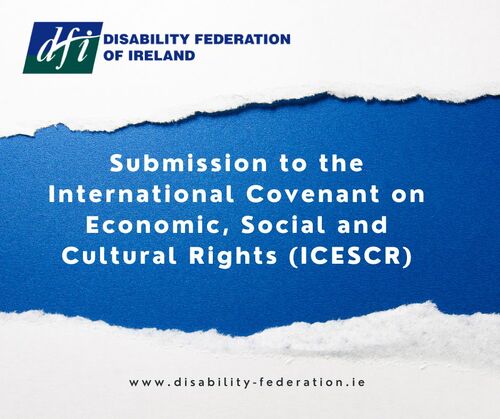Summary of the Concluding Observations on Ireland’s fourth periodic report to the Committee on Economic, Social and Cultural Rights
April 19 2024, 02:54pm

Summary of the Concluding Observations on Ireland’s fourth periodic report to the Committee on Economic, Social and Cultural Rights
In February 2024, Ireland presented its fourth periodic report to the Committee on Economic, Social and Cultural Rights. In March, the Committee issued its concluding observations on that report and all supplementary information.
DFI made a submission to the Committee highlighting many disability concerns. We also presented in the civil society session of Ireland’s review, along with Mental Health Reform and Inclusion Ireland, as well as many other civil society organisations.
Many of the Committee’s concluding recommendations echo issues that DFI highlighted in our input. Recommendations that are of particular note include:
Disability specific recommendations
Data
- Improve data collection in Ireland, and disaggregate data, including by disability, to better create policies to target disadvantaged groups. Use this data to close gaps between groups in the enjoyment of ESC rights. The committee particularly noted a need for improved data in the education sector, to address persistent inequalities in education attainment.
Discrimination and Inequality
- Add socioeconomic status to non-discrimination legislation, and take measures to combat persistent discrimination, including against people with disabilities, especially in the areas of especially in the areas of decent work, social security, health care and services, adequate housing and education.
- Address the inequality that disabled women in particular experience.
- Ensure that all policies to combat discrimination against disadvantaged groups are developed with the participation of those groups.
Employment
- Review employment policies to discover the root cause of persistent unemployment in disadvantaged groups, including people with disabilities, and take measures to improve the level of employment of people with disabilities.
- The committee expressed concern that current laws allow for different wages based on age and disability, and asked that a single minimum wage apply to all workers.
- More consultation is needed with workers when making reasonable accommodation decisions. The law should require this consultation.
Poverty
- The Committee expressed concern about the inadequacy of social security benefits. Ireland should establish a social protection floor, and ensure that social security covers everyone equally, provides sufficient support, and is indexed to the cost of living.
- Adopt a national plan to eradicate poverty and address the root causes of poverty, including address the housing shortage and persistence of homelessness.
- Ensure targeted support for groups who are disproportionately affected by poverty, including persons with disabilities.
Housing
- The Committee raised concerns about inadequately accessible housing, and the persistence of homelessness among marginalised groups.
- Adopt all necessary measures to address the housing deficit by ensuring a sufficient supply of housing, in particular social housing units, especially for the most disadvantaged and marginalised individuals and groups, including persons with disabilities.
Health
- The Committee expressed concern about problems in the health system, including low budgets, staff shortages and obstacles. preventing access to health services for the most marginalised
- The Committee recommended Ireland step up its efforts to ensure, a universal and comprehensive healthcare system, allocate additional resources to increase the capacity of Sláintecare, recruit and train additional healthcare personnel, reduce waiting times, and reduce obstacles that prevent access to health care for the most disadvantaged individuals and groups.
- Increase the budget allocated to mental health care
Other disability recommendations
- The committee recommended that Ireland ratify the Optional Protocol on the Rights of Persons with Disabilities
The Committee also made many general recommendations which are broadly relevant, including:
General Recommendations
- The committee expressed concern about the low budget dedicated to the realisation of ESC rights, and asked the state to thoroughly assess the effects of this policy on ESC rights, with the goal of adopting a fiscal policy that promotes ESC rights. This should be done with the participation of civil society. This would include increasing the budget in areas such as food programmes, social security, social housing, health care, education, employment, and other areas related to ESC rights.
- Strengthen the capacity of local authorities to address human rights and help people enjoy ESC rights.
- The committee asked Ireland to conduct a study of the domestic framework around Economic, Social and Cultural rights, to identify where Ireland’s framework is not aligned with the Covenant. The goal should be to bring Ireland’s framework in line with the Covenant.
- They recommended that the state take measures to support civil society to engage in advocacy around economic, social and cultural rights, including creating effective engagement mechanisms that go beyond traditional consultation, and ensuring civil society is involved in monitoring laws, policies and practices around economic, social and cultural rights (ESC rights).
These are only some of the recommendations of the Committee that touch on disability. You can read the full recommendations here.
Clearly, the Committee can see persistent inequalities in Irish society that disproportionately affect groups such as people with disabilities, and has made suggestions for ways that Ireland can address these inequalities. The next step is to encourage the government to take these recommendations seriously, and act on them. These recommendations are thus of relevance to many of us working on disability rights in Ireland.
ENDS
